Ideas From Four Unique London Bike Shops
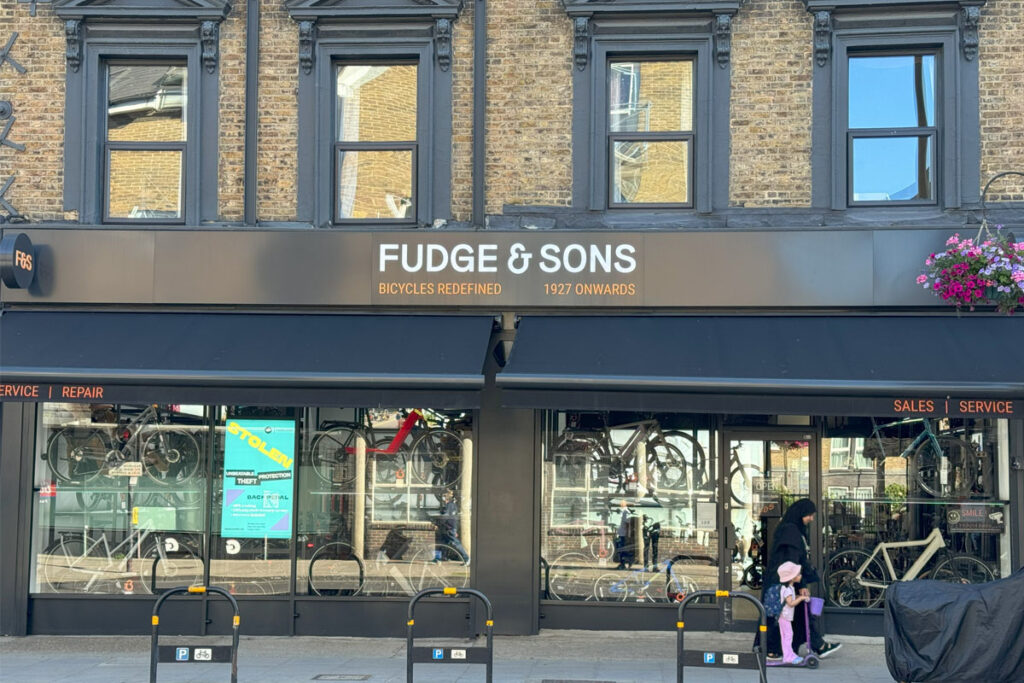
London, UK
This article is part two of a two part series about London bike shops. You can see part one entitled “Inside London’s Bicycle Retail Scene” here.
Recently I had the opportunity to spend a week in London and before arriving took the opportunity to tee up visits and interviews with the owners and managers of four leading bicycle retail stores.
Although they all faced some common challenges, they were varied businesses with different paths to success. They’re all quite different to typical Australian bicycle shops. That’s both because they reflect their local market customers and demand and because the constraints on physical shop spaces are quite different in London when compared to a typical suburban Australian bicycle shop.
Fudge & Sons London
I met Store Manager Daniel Wheeler, who was relatively new to this store, but he’s spent his whole career in bicycle retail.
Fudge and Sons is currently owned by Andrew Fudge who is the grandson of the founder.
There are two stores, the one I visited on Harrow Road in London and the second in Epsom, which is not far from the famous horse racing course of the same name, on the south western outskirts of London.
“This is the flagship store, Daniel said. “Both do very comparable figures, but the Epsom shop hasn’t had the same refresh and this and hasn’t been around for as long. This store has been run by the Fudges since 1927.
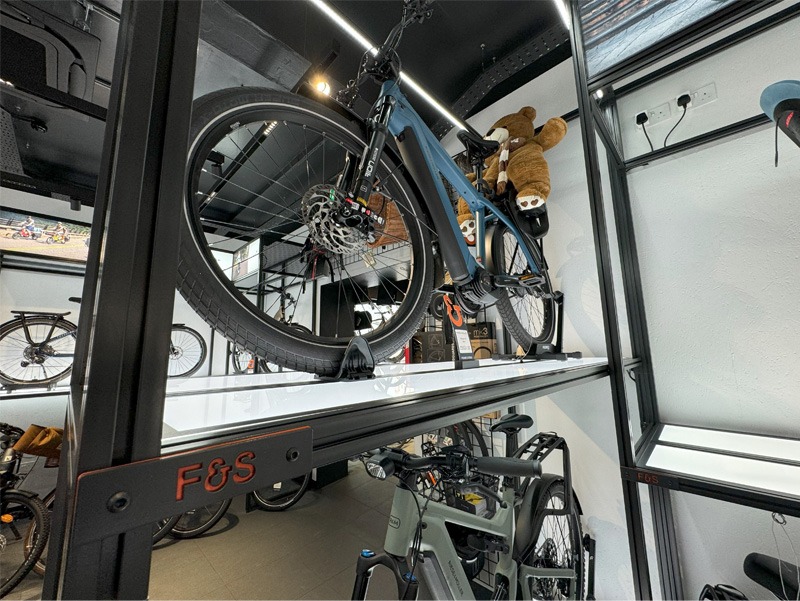
“Before the pandemic this shop was focused on manual (non- electric) bikes. Now we’ve taken the step with electric bikes. It’s always been a commuter based shop with the odd road bike and mountain bike here and there.
“Epsom is in the Surrey Hills, so they deal with a lot of mountain biking and now high end electric mountain bikes.
“Here, hybrids and Bromptons are our best sellers. We’re one of the biggest Brompton dealers in the country. They suit the area. Hybrids – general workhorse non-electric bikes we sell start at £475 (A$950) and up.
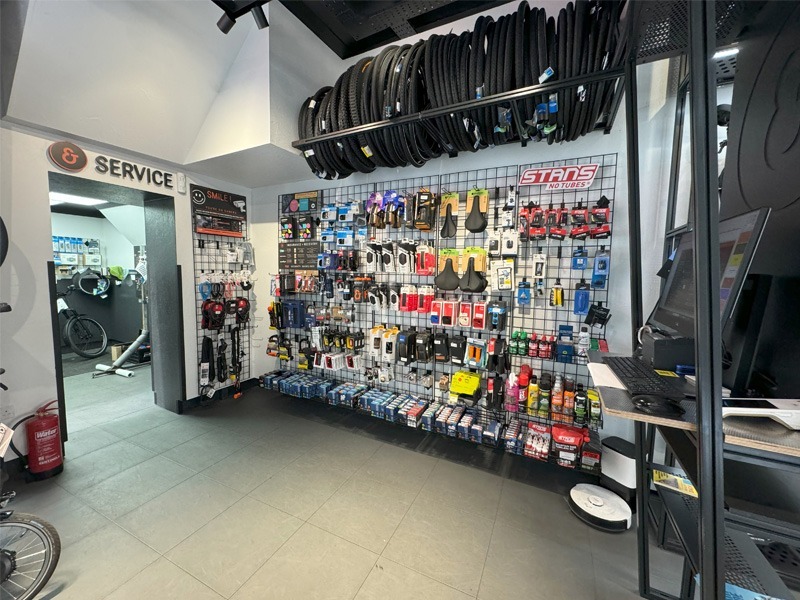
“We’re also dealing with a lot of electric cargo bikes now. The longtail style of bike is well suited to London. Not everyone has a big driveway or garage for a wide front load bike.
The Fudge family own their premises. It’s a big shop by London standards but Daniel readily concedes, “We are pushed for space. Everyone’s pushed for space in London!”
There’s a small bike checking area and workshop menu board in the main shop at street level, but the main workshop is down in the basement, accessed via external rear stairs.
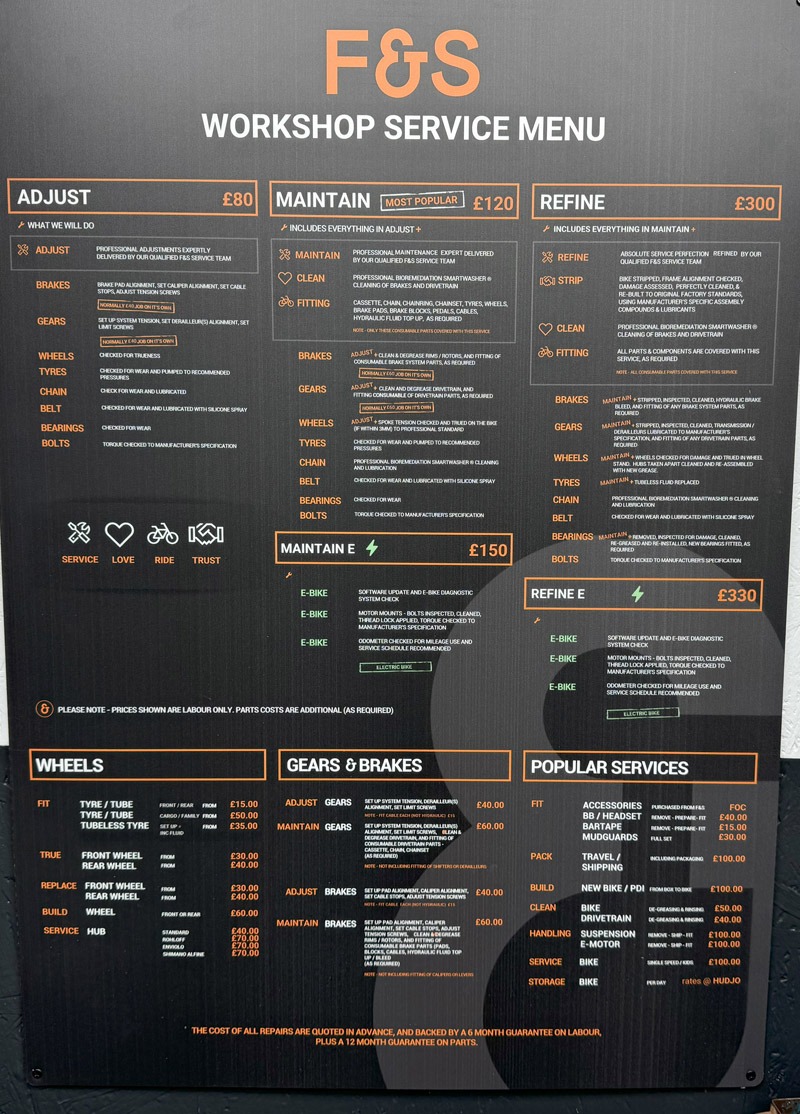
“We take in non-customer bikes, but for electric bikes, we only work on the systems that we sell, being Bosch, Shimano, Brompton,” Daniel explained. “If you turn up with a Chinese homemade electric bike, we’re not going to touch it!”
Fudge runs a tight crew, with just four members of staff, not including the owner: Daniel as store manager, a head mechanic, bike builder / mechanic and a salesperson / social media manager.
“Business is certainly better than last year,” Daniel said. “It’s ticking over. Today might be the first day when I was riding in when I thought I might need sunglasses. It’s been a very wet, cold year.
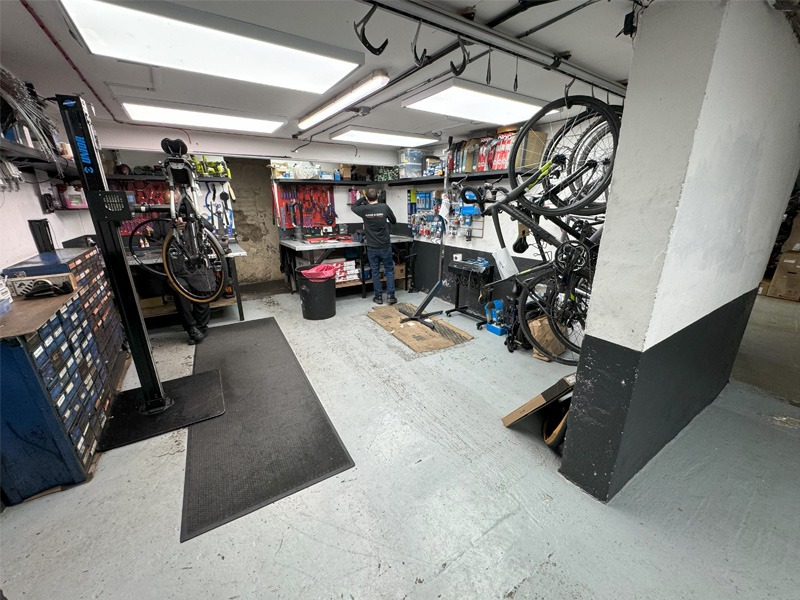
“It shows how many people who got into it during the pandemic and became “proper commuters” rather than just fair weather cyclists. A lot more people rely on their bikes.
“We don’t really sell clothing. We sell helmets and gloves, mudguards, saddles – everything else except for the clothing. Because there’s so much clothing online, you have to give so much space to clothing to have all of the colours and sizes. Then six months later, you’ve got to sell it at a discount.”
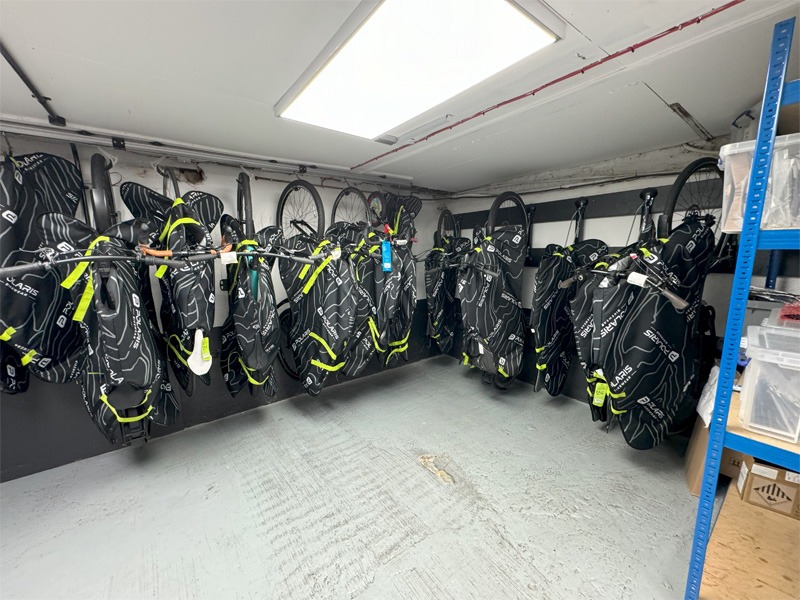
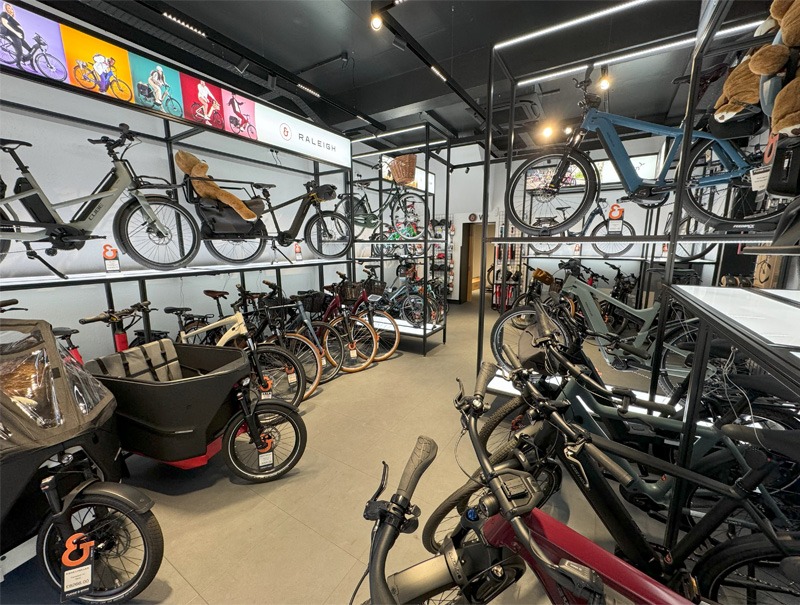
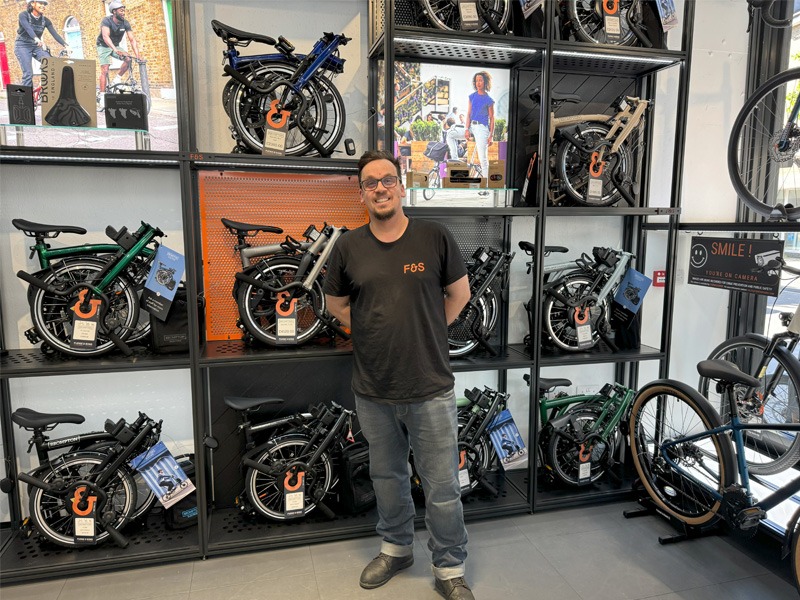
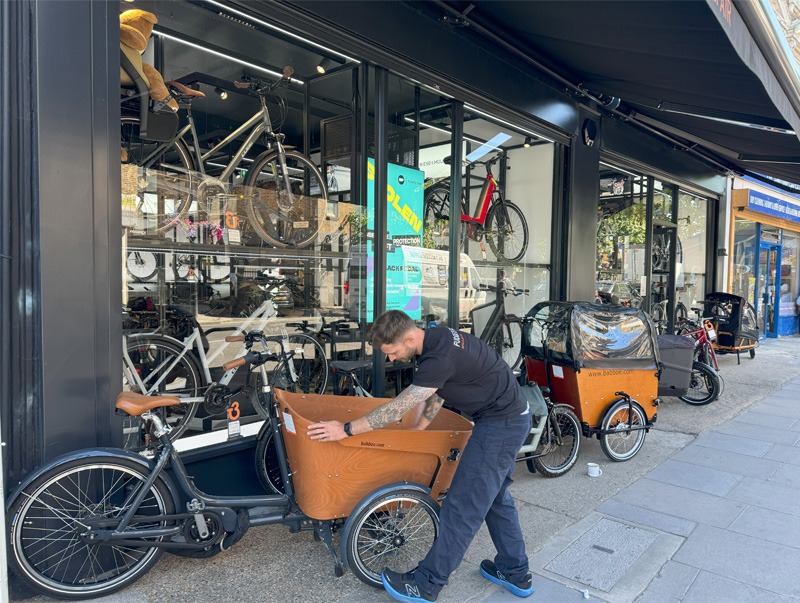
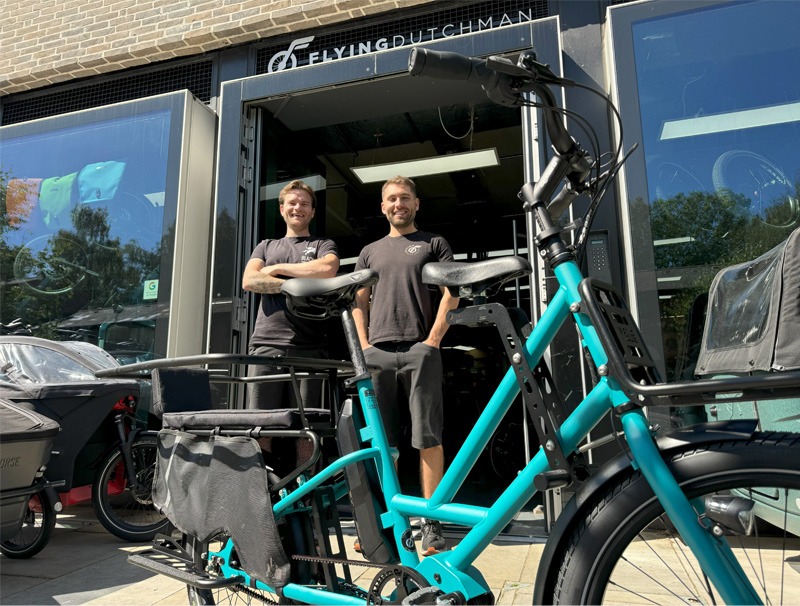
Flying Dutchman Bikes West
Flying Dutchman Bikes West was the only store I visited that was in a modern building. It’s in a quiet, mixed residential and light industrial area, with virtually no passing traffic.
There I met Store Manager, Rich Armstrong.
“The original shop is in Canden,” Rich explained. “It’s been there 12 years. This shop, Flying Dutchman Bikes West, has been here two years.
“The owner, Harry Walton began in the Camden store in the tiniest little room with big, steel, Dutch cargo bikes that you could barely fit three in the shop. Then he expanded and broke through the wall to the second shop, then the third, then the fourth. So he now was four little stores knocked into one that is still only about half the size of this one.
“I came on board four years ago, working with Harry in the Camden store as the mechanic. Neither of us has ever learned how to drive. This (cargo bikes) has always been the sensible thing in our minds. We’ve always only used bikes to get around, do the shopping…
Storage Space at a Premium
“Storage space is the big thing with this shop,” Rich explained. “We primarily deal with family cargo bikes – big heavy things. We were initially looking just for a storage location for the Camden store. “Looking into rental rates, they were not dissimilar for storage compared to renting another shop and we already had customers west of Camden.
“Most of our boxed stock here is storage for the Camden store. We have a cargo bike trailer and we do runs a few times per week to Camden moving stock.”
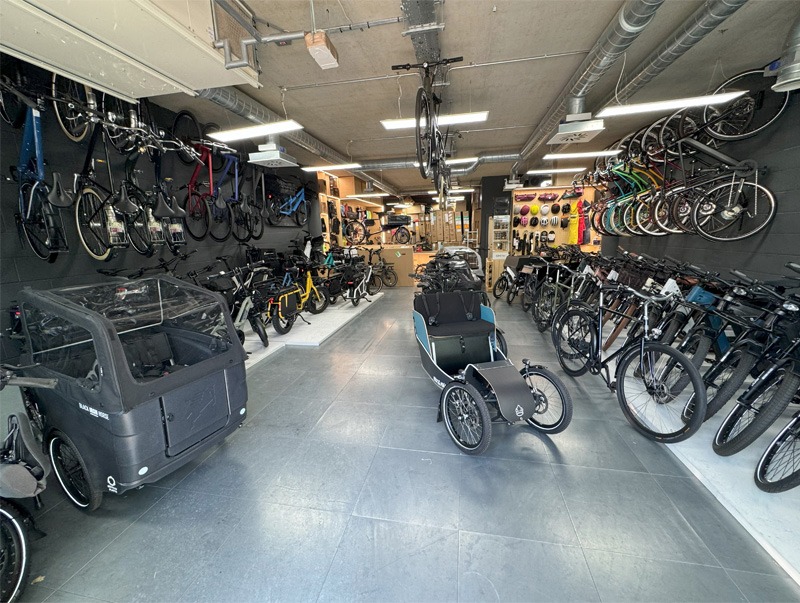
Appointment Only
Apart from deliberately selecting the quietest location they can find, another rare feature of Flying Dutchman is that they run both stores by appointment only.
“It started with covid when we had to do it that way,” Rich recalled. “But over that time, Harry found out that the customers preferred it that way and he preferred it that way too, rather than be stressed out in a tiny shop with three to five people and multiple bikes wanting service and sales.
“We’ve kept the appointment only system up since then. We’ve already had a conversation with the customer via phone or email. We’ve found out what their interests are so we can book them in for an hour and a half or two hours, run test rides, without getting interrupted…
“The same with repairs. Most bike shops run on a two week lead time. We only work on the bikes that we sell. A lot of our customers ditch their cars for this, or ditch their work vans. It’s their lifeline to get their kids to school or do their plumbing or electric work. And we know that you can’t have your vehicle off the road for two weeks.
“The commercial cargo bike side is definitely smaller for us. That’s primarily because the commercial customer is price driven, so if someone is willing to undercut, there’s no care and attention on where they buy it from.
“We do have smaller commercial customers such as a one man plumber or one man electrician, but the big commercial guys are just like, “I need 10 Urban Arrow XL’s. I have a guy that comes in and repairs them all.” They don’t care – it’s just who’s willing to make the least amount of margin.
“For family bikes, for Camden the bestselling bike is the Veloe Multi, which is a bike brand from Italy. We’re the sole UK importers for Veloe.
“For us here, an Urban Arrow Family, because it can carry three kids on the front. Also the Riese and Muller Multitinker is an amazing bike for us.
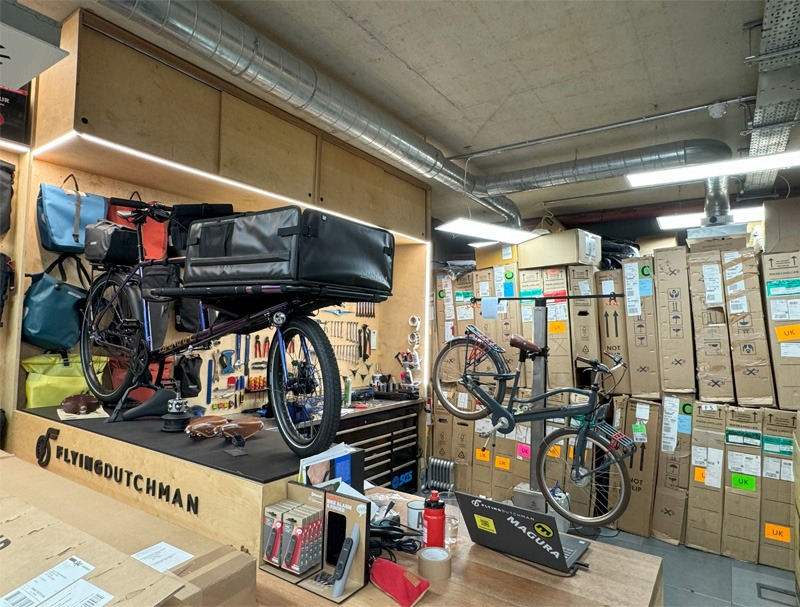
“Part of it is always what we love the most. We explain to customers what works for us, but say to them, “Test ride everything! There are no bad decisions in here.”
“There’s only four of us in the company. If we don’t have full faith, trust and love for it, we don’t deal with it.
“We’re pretty much the only people in the UK with Achielle. They’re hand built in Belgium on the same carrousel that the bikes have been built on since the company began in 1946. It’s not the best seller for us, but they make such nice quality bikes and classic steel bikes with modern equipment like hydraulic disc brakes, carbon fibre belt drives, Alfine (Shimano) gear systems. They start from around £1,600 (A$3,200) for a non-e-bike and £4,000 (A$8,000) for an e-bike.
“Gocycle is a folding e-bike from up the road in Chessington. The way they do their sales is really good for bikes shops. The customer buys direct online from Gocycle, but the bike shop gives them a code. It will be sent here and we build it for you, give you your first free service.
“Gocycle gives us a cut of the sales at the end of each month. We don’t need to hold stock or worry about whether we’ve over ordered or under ordered. They start from around £3,800 (A$7,600).
“We only sell the P&A that you need for the bikes. Bags, locks, lights, helmets, alarm systems, trackers. We don’t jump into clothing and extra things.
Test Riding is Their Sales Key
Rich continued, “Our primary customer is not a “cyclist”. A lot of the people who come in here haven’t even ridden a bike in the past 20 years.
“We do no advertising or marketing. Potentially we should, but we have a good reputation for customer service and getting people onto these things.
“We just say to everyone, “We’re not going to pressure you into buying anything. Come in the door. I’ll tell you what I like and works for our families.” And we’ll just get people to test ride everything, then, “You tell me what you like and what you don’t like and you can make your own informed decision.”
“When we were looking for this location, it took us about six months. The primary thing was, off the beaten track, quiet roads where people can test ride. We didn’t want to be on the high street. We don’t want people walking in, day in, day out. We want to be able to spend quality time with our customers and for them to feel safe test riding these bikes for the first time.
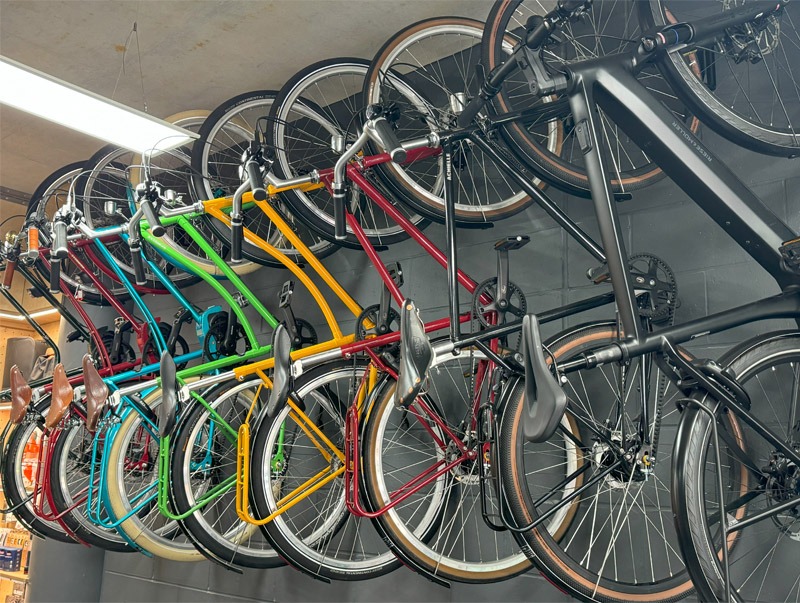
“People do leave them on streets if it’s the only place they’ve got. As long as you’ve got an anchor point to lock it to. Especially for London, the main locks we sell these days are angle grinder proof locks from Abus and Hiplok. Along with motion sensor alarms and trackers.
“And there’s even tracking insurance with a company called Backpedal. If your bike is stolen they will track it down and at the moment they’ve got about 80% success rate in tracking the bike down and getting it back for you.
“It’s a huge part of the conversation – working out how people can safely store these things. A lot of our customers take photos of their house, garden, side path, and loads of measurements. We go through all of that with them. As long as they’re within half an hour ride of the shop we take their ID and say, “Go give it a test ride to your house and see if you can fit it in there!”
“Everything you see in the shop is a demo bike and we order off these. We’ll either have stock or it will be a week or two to get the bike in. But it means that someone can walk in here today and test ride everything you see.
“Usually after a couple of years we’ll sell the test bikes. They don’t get hundreds of miles on them or abuse.
“Business has declined back to slightly better than it was previously (before covid). But the last year has been a bit pressing. I think people overstocked thinking that the high would last forever. We never did that. We always stayed cautious.
“The joke I’m hearing now from industry people is, “Survive till ’25!” Everyone who survives until 2025 is going to be reaping the benefits,” Rich predicted.
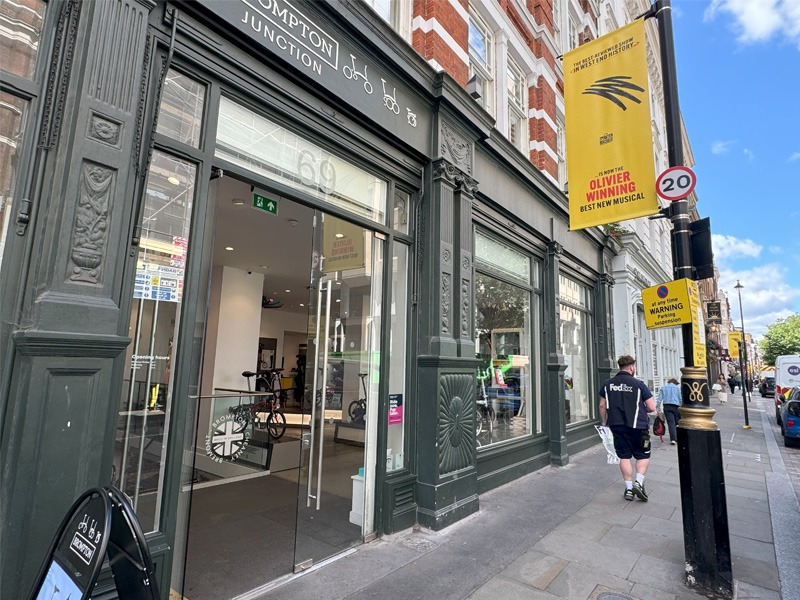
Brompton Junction Covent Garden
Unlike the other stores in this article, Brompton Junction Covent Garden is a company-owned store as opposed to owner operated.
Brompton is not a huge brand in Australia with only about 15 dealers in total, so it might surprise you to learn that Brompton had global annual sales of £106.9 million (A$214 million) in the 12 months to 31/3/2022, which comprised 93,460 bicycles sold that year – all being just one rather quirky looking, small wheeled folding bike design. But it comes in a range of nuanced variations that are divided into four lines.
Perhaps even more surprising is that all these bikes are fully manufactured, including the frames, in their London based factory that employs about 200 staff.
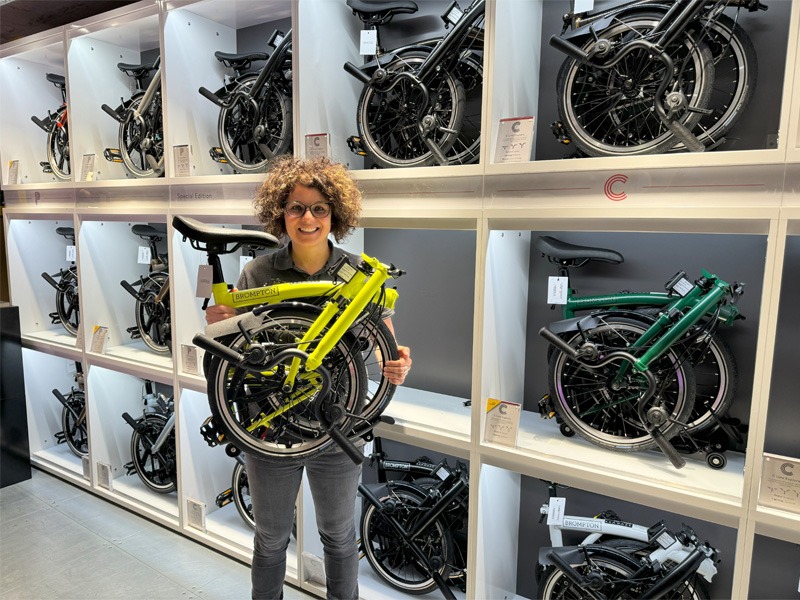
In addition to a diverse range of dealers and distributors worldwide, Brompton retails bikes through their flagship Brompton Junction stores, some of which are company owned, including the Covent Garden location I visited, which is now their sole London based Brompton Junction.
There I met Store Manager Francesca Ricci who has worked her way up through the ranks at Brompton Junction over the past nine years.
“I already knew the Brompton brand from before I joined the company, when I was living in Rome. I started here as a part time sales assistant, then full time sales assistant, then senior salesperson, assistant manager and now manger – all in this shop,” Francesca explained. “The shop was opened in 2013. In 2021 we moved here from a smaller shop premises.
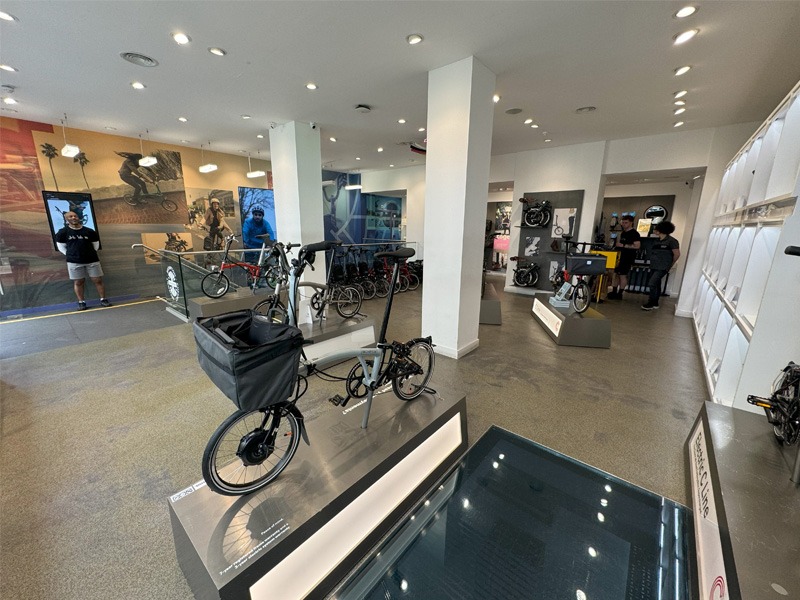
Moving during 2021 was also during the height of covid, which was particularly severe in the UK. “The pandemic was a crazy time,” Francesca continued, “But it was also the time when we sold the highest numbers of bikes. Everyone wanted to have a bike. We were working on an appointment basis.
“Now the market… I wouldn’t say that it’s full. This shop is still doing well, but it’s less compared to the pandemic, when we had customers queuing up outside and our factory production line couldn’t keep up.
“Last week we sold 40 bikes. This week we’ll sell around 20. It’s really up and down. We used to do even more during the pandemic and we sell more when we launch a special edition.
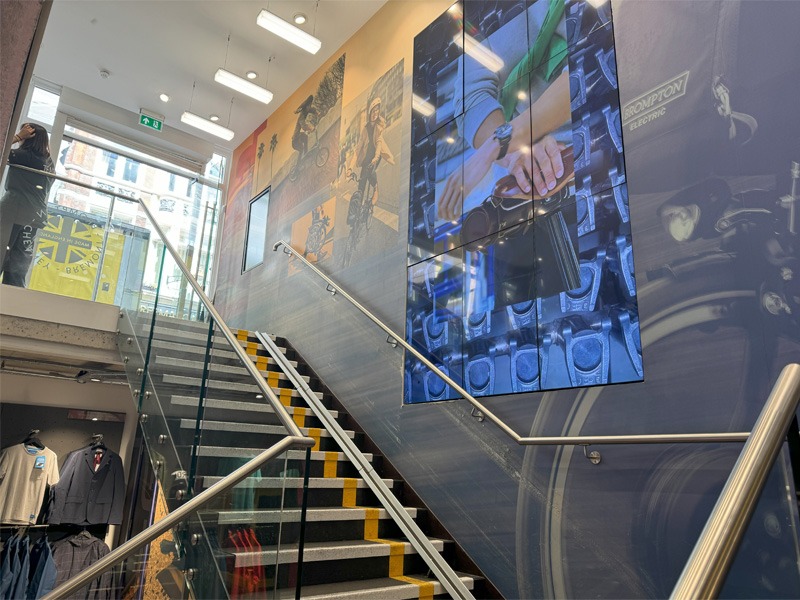
“We just launched the Palace Special Edition in collaboration with Palace, which is a young skateboarding brand, and we sold out in one day,” Francesca said.
Although Brompton have essentially been making the same single model of bicycle for over 50 years, there’s now four subtly different varieties named the A Line, C Line, T Line and P Line. Of these the C and P also come in electric versions.
“Our best seller is changing,” revealed Francesca. “The C Line, in six speed with a medium handlebar was the best seller, but now the P Line is picking up as well. Electric is picking up as well.”
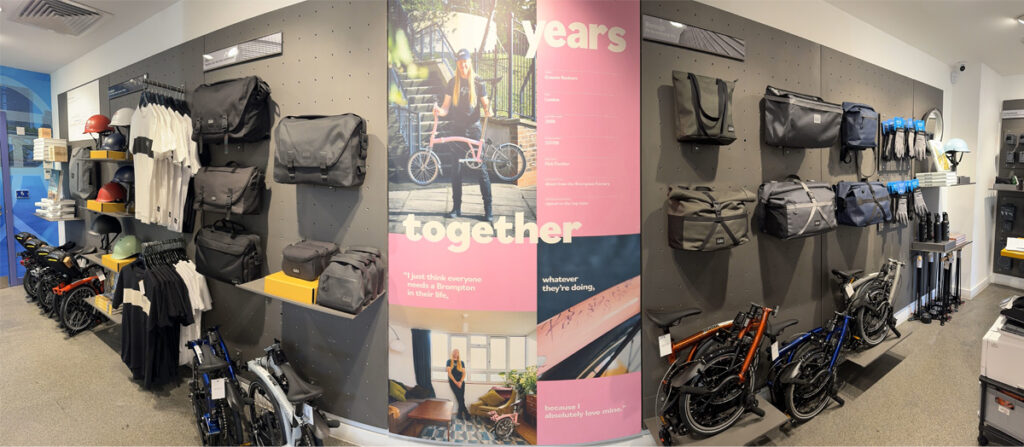
The shop is on two levels, spacious and uncluttered, but not especially large. One advantage of selling folding bikes is that all stock is displayed folded, apart from one sample bike from each of the four lines. This saves a lot of space and helps make the business viable, despite being located in what would be a fairly high rent city location, just around the corner from Covent Garden.
“We can hold about 160 bikes including the ones on display plus two stock rooms,” she continued. “We only service Brompton bikes in our workshop. We have four full time mechanics and one part time plus the workshop manager.
“We have 14 people altogether – full time and part time. We’re open seven days a week 363 days per year. We do two shifts each day. We’re open 9 am to 7 pm Monday to Friday 10 am to 6 pm on Saturday and 12 noon to 5 pm Sunday.
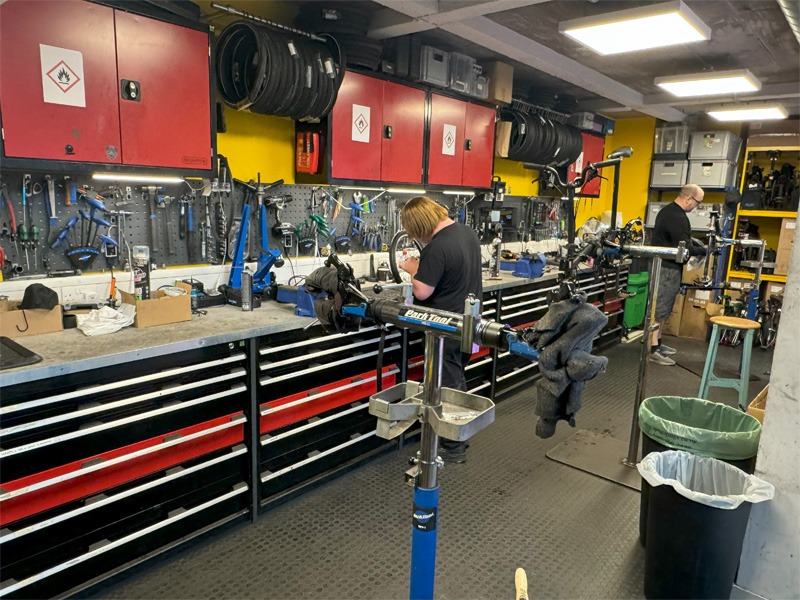
“We run events in the shop. We’re trying to get more active and engaged with our community. We have a social media page which is really active.
“We sell spare parts through the workshop plus a range of accessories. They’re basically for Brompton customers. Our best seller is a toolkit that fits inside the frame and sells for £65 (A$130).”
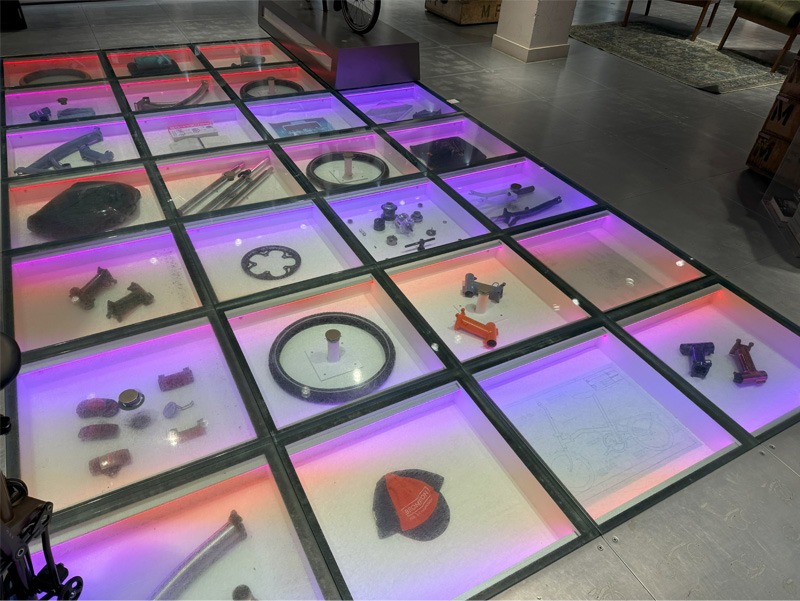
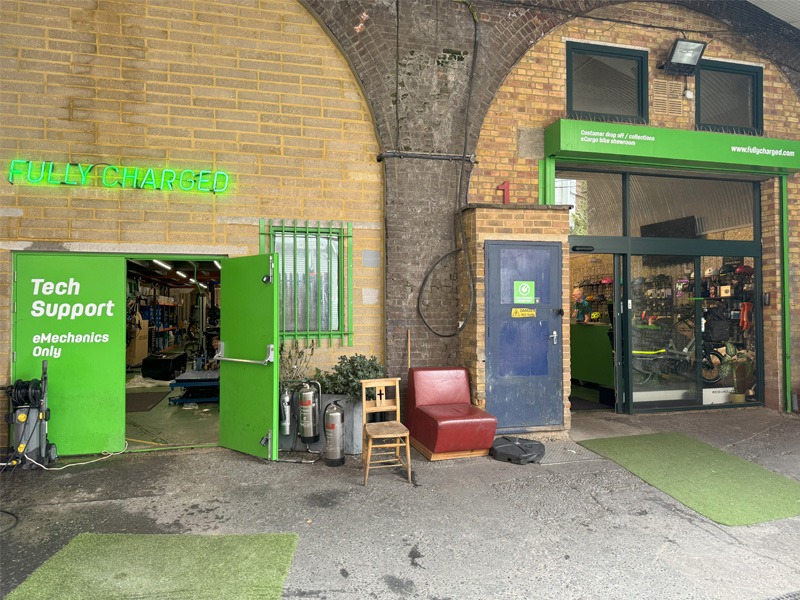
Fully Charged, London Bridge
In a city that’s crammed full of people, every available space is used. Famously in London, this includes railway arches. There are literally hundreds of shops, small warehouses and other businesses that live within huge old brick archways that support railway lines above.
They offer the disadvantages of being cold and damp during winter, with a regular low rumble as trains pass by overhead. Their key advantage is relatively cheap rent and in most cases, a high arch that can also accommodate a mezzanine floor.
But even their saving grace of cheap rent is diminishing, as in recent years the previously benign railway authorities stopped handling the management themselves and sold of the rights to a privately owned business called The Arch Company that now manages over 5,000 railway arch commercial spaces nationwide and has been maximising revenue.
Fully Charged is a bike shop that occupies four adjoining railway arches beneath London Bridge Station. It’s on the south bank of the Thames, halfway between London Bridge and the much photographed Tower Bridge, with the equally famous Tower of London being only about five hundred metres from Fully Charged’s front door.
There I met part owner Dan Parsons, who began by explaining the unique history of this equally unique business.
“Ben Jaconelli who founded the business back in 2014 is from an automotive background,” Dan said. “His family have got a supercar dealership. A supercar is everything from a Ferrari upwards.
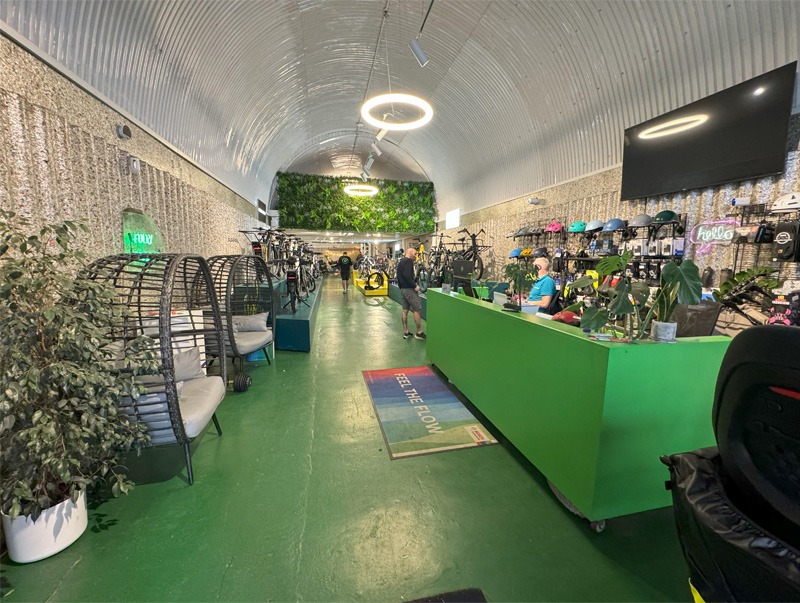
“Ben saw the excitement of e-bikes before everyone else did and started the business in a one room former bank that he shared with a coffee shop. Prior to that he had a popup in Old Street tube station – underground, in the tube station, away from cyclists.
“People thought he was completely bonkers! But he was trying to explain that electric bikes aren’t necessarily for cyclists. He had a different type of captive audience and he did very well.
“The true story is than Ben lost his driver’s licence for a while and got an e-bike and was like, “This is the future!” So he jumped from a comfortable lifestyle driving Bugatti’s and things like that into the cycling world. I think sometimes he regrets it and other times he absolutely loves it.”
Meanwhile, Dan was working at another London based e-bike pioneer, Gocycles, where he was the first employee and worked there for nine or so years.
“Towards the end of my tenure I was on the commercial side of things and I was selling Ben Gocycles and advising him,” Dan recalled. “So I had an active role in Fully Charged from the very beginning, but I jumped ship (from Gocycles to Fully Charged) in 2017.
“Today we’ve got 10,000 square feet (1,000 square metres) in our London location and we’ve got four other locations outside of London.”
Only one of their four arches is open to the public as retail space. The second houses their workshop and the third and fourth are for warehouse storage.
“We’re about 16 people at this location,” Dan continued. “Between five and six mechanics full time. The rest are split between sales and admin. Outside of London the rest of the stores run two to three people. But this site does the management of the other stores.
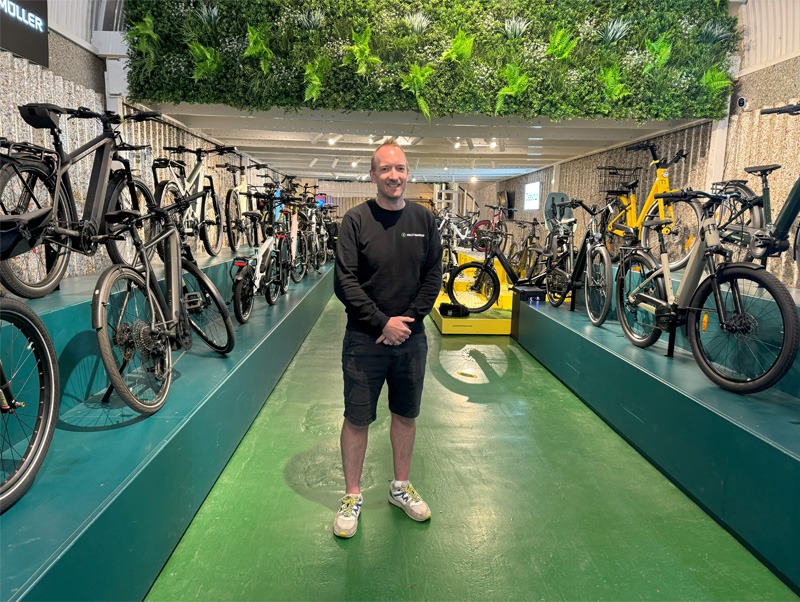
Me, We and B2B
“We focus in three verticals,” Dan explained. “We call them “Me, We and B2B”.
“Me is your individual leisure or commuter rider.
“We is the family.
“B2B is the commercial side of things. We work with small private companies up to public companies and local authorities. It’s the fleet management side with quite big clients.
“We boomed during covid as I think most people did. We grew 110% from 2019 to 2020. It’s continued to grow year on year, but it’s more of a plateau.”
But Fully Charged was not an automatic success story from day one. It took a little while to fine tune their product offering and find their niche.
Dan continued, “When I started here we got rid of all the entry level products. We realised that we could spend an hour and a half selling a low-end product that would make us a few hundred pounds of margin. Or we could invest our time into high end stuff, everything from £3,000 (A$6,000) upwards. We could spend the same amount of time, make considerably more margin, and the customer gets a more durable, higher quality bike.
“We’re about investment in the product. We offer financing and leasing opportunities. This is about getting something good. We work with Europe’s premium manufacturers. Riese and Muller, Moustache, Gocycle, Tern, Urban Arrow, Benno and a bunch of others.”
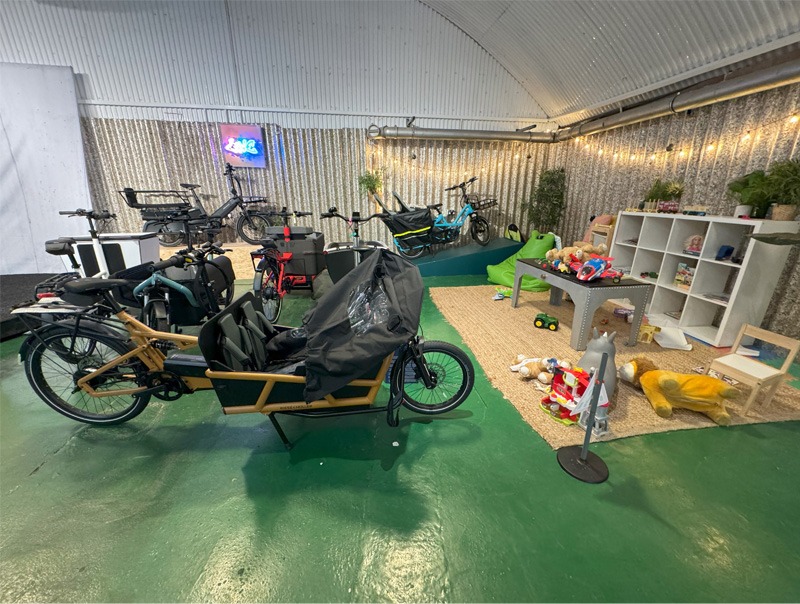
Cycle to Work Scheme
Unlike Australia, the UK has a long-established national scheme that encourages any employees to purchase a bike in a highly tax advantaged way. Fully Charged support the scheme, but it hasn’t been all roses.
“In the past five years we’ve gone from somewhere close to 5% to more like 30% of our sales through the Cycle2Work scheme,” said Dan. “Everyone’s looking to save money wherever they can.
“The scheme used to be capped at £1,000 (A$2,000). That cap was removed in 2019. It’s now down to the employer to set the cap – it’s at their discretion. The bike is purchased out of your gross earnings. Therefore you save the equivalent of your tax on the price of the bike.
“Up to 48% of the price of the bike can be saved, depending upon your earnings.
It’s a salary sacrifice scheme so it comes out of year earnings every month, so you don’t really see it coming out. It means people can afford to buy a quality product and get out on the road.
“Some people are buying the bike through this scheme, using them for a year and selling them for more than they paid, then going again.
“We’ve got maybe a dozen financers that we work with. The employee comes in holding a voucher for say £3,000 (A$6,000). We only see £2,700 (A$5,400) of that because we pay 10% to the scheme provider. It’s a big hit on profit for us. But it’s another customer for us, another bike on the road and they’re saving an absolute fortune.
“We wish we didn’t have to pay the exorbitant fee. There are a few that have capped their fees.
The disappointing thing is that it was always 10% back when they had the £1,000 (A$2,000) cap. But when the cap was removed, some of our bikes are up to 10, 11, £12,000 (A$24,000) so you might be paying £1,100 (A$2,200) quid for nothing. They’ve not got any more work to do than on a cheap bike.
“There was a backlash from the bike industry and some of them have capped their fees at £300 (A$600), but it varies between providers.”
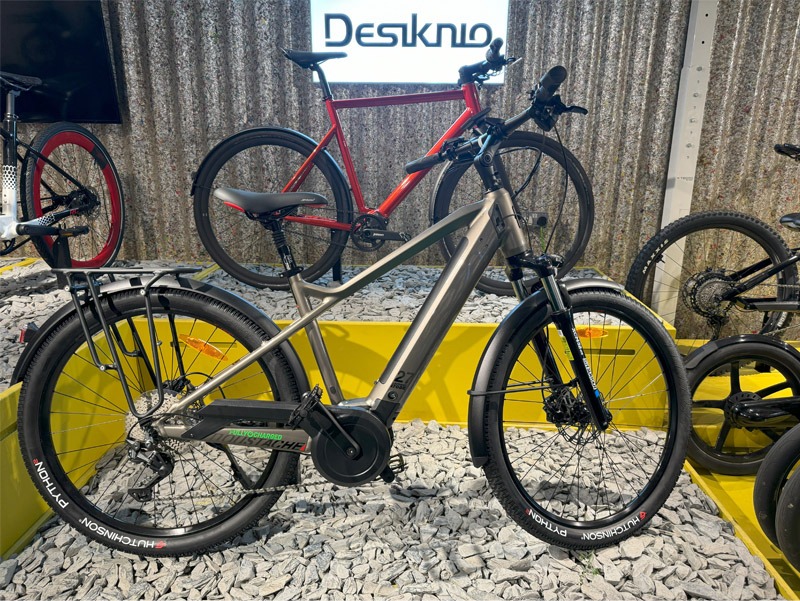
Commercial Fleet Sales
One important part of Fully Charged business is selling commercial cargo bikes to corporate and government fleets. This sort of business is embryonic in Australia, but it’s already commonplace in London for a tradie to get to work with their tools in a cargo bike rather than a big 4×4 ute that their typical Aussie counterpart would use.
“It’s about learning what their requirements are,” Dan explained. “We do the Voc, Urban Arrow XL and a bunch of others.
“We’ve got butchers and bakers using front loading cargo bikes. Some of them are insulated so that they can move hot foods or cold foods. We’ve got the medical industry moving test samples, construction industry, florists, laundrettes, gardening companies, grocers, obviously general couriers. You name it, if you can move it in a van, you can use a cargo bike.
“It’s definitely the part of our business that we feel has got the most potential. We’ve got something called the ULEZ (Ultra Low Emission Zone) so it’s costing more now to bring bigger, more polluting vehicles into the centre. We’re trying to switch them out to greener, more efficient cargo bikes.”
Meanwhile, as of 2024, the family cargo bike market still provides a larger volume of sales for Fully Charged than commercial fleets.
Dan continued, “The family side is definitely where the growth has come over the past couple of years. We’ve got school streets where in some London Boroughs you can’t drive your kids to the school for half an hour before it starts and half an hour after it finishes.
“If the only alternative is to drag tired kids for a 40 minute walk home after school or a fun e-cargo bike ride, there’s no question. We’ve started a campaign called #schoolrunmorefun
We’ve got lots of ambassadors in the parents who do it, referral schemes and so on.”
Despite all of these initiatives, Dan still sees hurdles to be overcome.
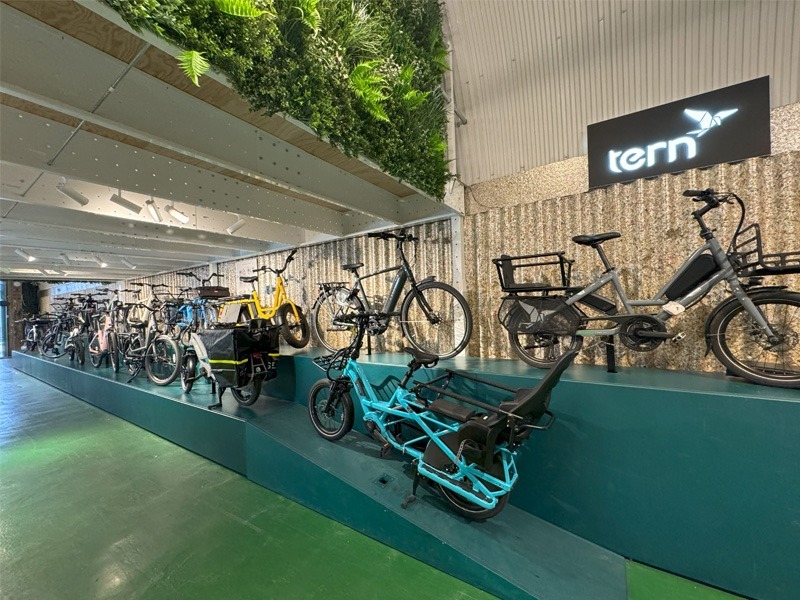
“British people are notoriously lazy!” he exclaimed. “We don’t like the wet weather and it’s rained all year!
“There’s rising theft. Trying to convince people to buy a nice bike that might get nicked is tricky. We’ve had a few customers telling us that their bikes have been stolen and worse than that, we’ve had a few mugged. It’s horrific.
“Then there’s lithium battery fires and the name of electric bikes is getting tarnished.”
Fully Charged only stocks the basic P&A lines required to support their bicycle customers, in particular locks and helmets. They leave it for others to carry a wider range of accessories.
They also restrict the bikes they’ll service through their workshop.
“We’re constantly flat out with servicing,” Dan reported. “Over the past 18 months we’ve had competitors that have gone into liquidation. We’re taking on the burden of their existing customers.
“We don’t just take on any bike. They have to be bikes or drive systems that we sell. For example, we will take in a brand we don’t sell if it has a Bosch drive.”
Conclusion – More Than One Way to Skin a Cat
As you can see, the four shops I visited were very diverse. Fudge & Sons was the closest to a typical Australian shop, but its fitout, particularly its unique illuminated bike display shelving was a cut above.
The other three had no direct comparisons in Australia: Flying Dutchman being an appointment only store that only has demo bikes on the showroom floor, Brompton Junction London being a store that sells nothing but folding bikes and Fully Charged being a store where only 25% of its floorspace was open to the public – and the deep, muted rumbling of trains overhead!
But one thing they had in common both with each other and with successful Australian bike shops – they’re all meeting their customers’ needs and doing well in this challenging post-covid bicycle market.
